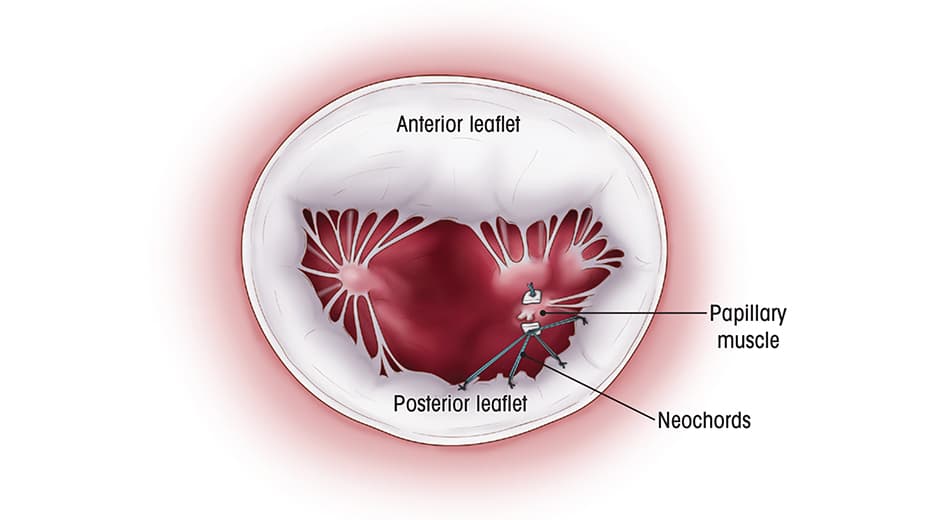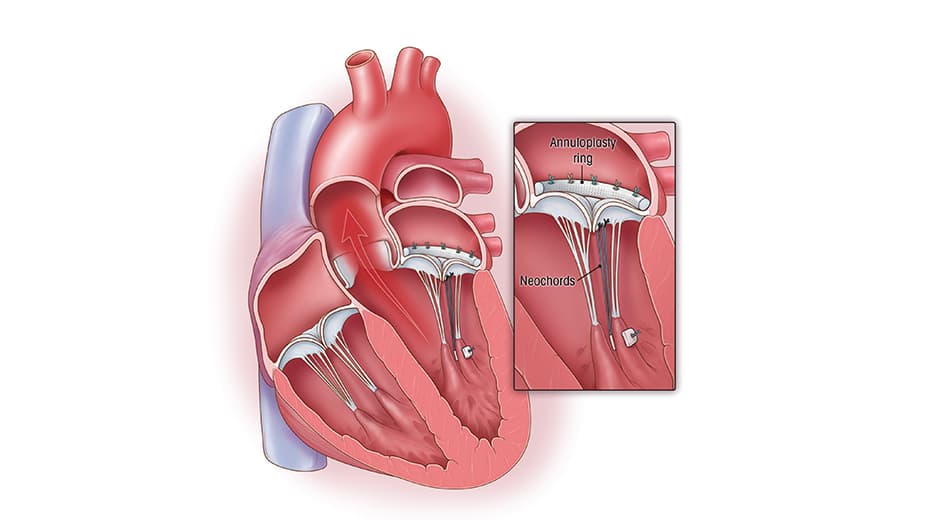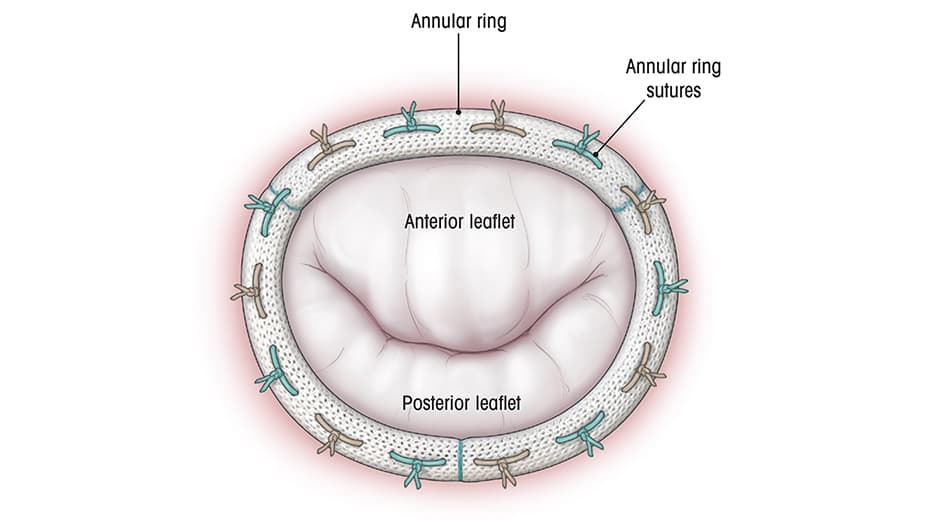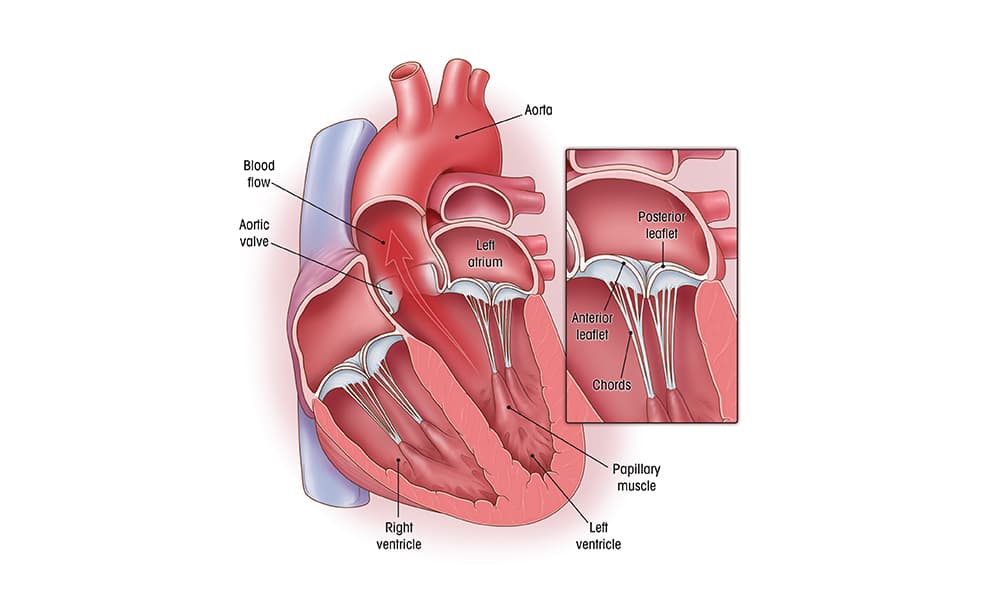Overview
Specialists in the Heart Valve Program at the Massachusetts General Hospital Corrigan Minehan Heart Center work closely with patients and referring physicians to determine the treatment plan that is best for each patient. Not all patients with mitral valve regurgitation are candidates for the minimally invasive mitral valve repair (see below for eligibility).
About the Mitral Valve
The heart has four valves: mitral valve, aortic valve, tricuspid valve and pulmonary valve. The valves ensure that blood flows in one direction through each of the heart's four chambers, and then out of the heart and into the body.

View of a normal mitral valve.
The mitral valve has two leaflets (anterior leaflet and posterior leaflet) that open and close to let blood pass from the left atrium (upper chamber) to the left ventricle (lower chamber).
When the mitral valve fails to close and seal completely (mitral valve prolapse being the most common), blood flows backwards into the upper chamber. This condition, known as mitral valve regurgitation (or mitral insufficiency), is one of the most common forms of heart valve disease.

Image of mitral valve prolapse.
Severe mitral valve regurgitation can cause the heart to enlarge over time and pump blood less effectively. As a result, patients may develop heart failure and experience symptoms such as:
- Fatigue and weakness
- Shortness of breath
- Swollen feet or ankles
- Abdominal fullness
- Abnormal heart rhythms, primarily atrial fibrillation (palpitations)

Image of a broken mitral valve from the left atrium.
Mitral Valve Repair Procedures
In some cases, a patient may need to undergo valve replacement surgery. Other times, the mitral valve can be repaired in a couple of different ways:
- Sternotomy, where the surgeon divides the sternum in the front of the chest
- Minimally invasive mitral valve surgery, where small incisions are made through the chest
In either approach, the mitral valve is analyzed and repaired in a step-wise manner. Various techniques are available to the surgeon in order to make the valve competent again.
Patients with severe mitral regurgitation where mitral surgery is not recommended (for example, patients with very high surgical risk) may be candidates the MitraClip system. This procedure uses a small clip to repair the heart's mitral valve to treat mitral regurgitation. The clip is inserted through the venous system without any chest incisions.
Surgically Repairing the Mitral Valve
Mitral valve repair involves reconstructing the mitral valve leaflets so that the leaflet edges meet and properly seal again. This usually entails either a removal of the flail portion of the leaflet (the portion not supported by the ruptured/broken chords) or placement of new chords—or both in some complex cases.
Repairing the mitral valve rather than replacing it with an artificial valve may prevent the need for lifelong use of blood-thinning medications. It also preserves the internal structure of the heart, which may keep patients healthier in the long run.
Two different mitral valve repair techniques may be used. In both techniques, small incisions are made in usually the right chest wall so that the surgeon can insert small instruments to repair the valve.
Resectional Technique
- The diseased portions of the mitral valve leaflet are surgically cut out
- The gap between remaining portions of the leaflet is closed with a surgical stitch, also known as a suture
- After the leaflets are repaired, the surgeon places a special ring (an annuloplasty ring) to restore the original size of the mitral valve and to ensure a lasting result of the repair by recreating the tight seal between the two leaflets
Neochordal Technique

View of repaired mitral valve using the neochordal technique from the left atrium.
- By using a special non-absorbable stitch that acts as a set of new chords, the remaining leaflet is brought back into a position where it can meet with the other leaflet to form a tight seal
- Frequently, the surgeon might also need to close small gaps between portions of the leaflet
- After the leaflets are repaired, the surgeon places an annuloplasty ring to restore the original size of the mitral valve and to ensure a lasting result of the repair by recreating the tight seal between the two leaflets

Repaired mitral valve using the neochordal technique

Final result of the repaired mitral valve using the neochordal technique.
Benefits of a Minimally Invasive Approach
Compared with traditional open surgery (sternotomy), minimally invasive procedures tend to result in:
- Faster recovery
- Quicker return to work/active lifestyle
- Shorter hospital stays
- Smaller scars
Who Is Eligible for the Procedure?
Not all patients are candidates for the minimally invasive mitral valve repair approach. Some might require another procedure on their heart, such as a coronary artery bypass grafting procedure, and therefore would need to undergo their surgery through a traditional sternotomy approach.
Some patients may not be candidates for the minimally invasive approach due to other conditions that may be present, such as:
- An enlarged aorta
- A hardened mitral valve from large amounts of calcium deposits
- Previous surgery in the right chest
- Hardened peripheral vessels (veins and arteries outside the chest or abdomen) from calcium deposits in older patients
Eligibility is discussed in detail during the preoperative clinic visit.
How Safe Is the Procedure?
The surgery itself is safe and carries a low complication rate. The success rate is similar to conventional mitral valve repair. More than 95% patients who underwent minimally invasive mitral valve surgery at Mass General had a successful mitral valve repair.
Patient Experience
Patients meet with members of the Heart Valve Program care team to discuss the best treatment approach.
Preparing for the Procedure
Prior to the minimally invasive mitral valve repair surgery, the patient will be asked to undergo a test to better assess the coronary arteries of the heart. This can be done either by coronary catheterization (a minimally invasive procedure used to access the coronary circulation of the heart using a catheter) or by a special computed tomography (CT) scan and will be further discussed during the preoperative discussion with the care team.
Recovery and Follow-up
After the surgery, the patient generally stays one to two days in the intensive care unit and two to four days on the regular postoperative floor. Patients are given clear instructions prior to the discharge home or to rehabilitation as well as a follow-up appointment with the surgeon and their cardiologist.
Depending on the approach and patient’s overall health, recovery after the surgery can be as short as four to six weeks or can require up to three months.







